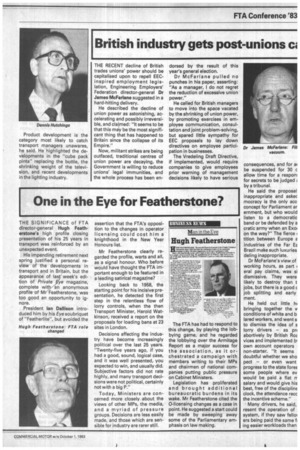One in the Eye for Featherstone?
Page 61

If you've noticed an error in this article please click here to report it so we can fix it.
THE SIGNIFICANCE of FTA director-general Hugh Featherstone's high profile closing presentation of his 25 years in transport was reinforced by an unexpected event.
His impending retirement next spring justified a personal review of the developments in transport and in Britain, but the appearance of lasi week's edition of Private frye magazine, complete wit.----an anonymous profile of Mr-Featherstone, was too good an opportunity to ignore.
President Ian Dallison introduced him by his Eye soubriquet of "Featherlite", but avoided the
assertion that the FTA's opposition to the changes in operator licensing could cost him a knighthood in the New Year Honours list.
Mr Featherstone clearly regarded the profile, warts and all, as a signal honour. Who before would have thought the FTA important enough to be featured in a leading satirical magazine?
Looking back to 1958, the starting point for his incisive presentation, he detected the first step in the relentless flow of lorry controls, when the then Transport Minister, Harold Wetkinson, received a report on the proposals for loading bans at 23 sites in London.
Decisions affecting the industry have become increasingly political over the last 25 years. "Twenty-five years ago, if you had a good, sound, logical case, and it was well presented, you expected to win, and usually did. Subjective factors did not rate highly, and many transport decisions were not political, certainly not with a big P."
Today, Ministers are concerned more closely about the views of other MPs, the media, and a myriad of pressure groups. Decisions are less easily made, and those which are sensible for industry are rarer still. The FTA has had to respond to this change, by playing the lobbying game, and he regarded the lobbying over the Armitage Report as a major success for the association, as it orchestrated a campaign with members writing to their MPs and chairmen of national companies putting public pressure on Cabinet Ministers.
Legislation has proliferated and brought additional bureaucratic burdens in its wake. Mr Featherstone cited the 0-licensing changes as a case in point. He suggested a start could be made by sweeping away some of the Parliamentary emphasis on law making. consequences, and for a( be suspended for 30 c allow time for a responi for secrets to be judged by a tribunal.
He said the proposal inappropriate and askec mocracy is the only acc. concept for Parliament ar ernment, but who would listen to a democratic band or be defended by a cratic army when an EX01 on the way?" The fierce tition between Europe a industries of the Far EE Brazil make such luxuries deling inappropriate.
Dr McFarlane's view of working hours, as part I erai pay claims, was si dismissive. They were likely to destroy than t jobs, but there is a good c job splitting and early ment.
He held out little fe bringing together the v conditions of white and b la red workers, and went s to dismiss the idea of s lorry drivers — as pr( abortively by British ROE vices and implemented IT own account operators • non-starter. "It seems doubtful whether we sho pect — or even want progress to the state fores some people where ev would be paid a flat rr salary and would give his best, free of the disciplinE clock, the attendance recc the incentive scheme."
• Many drivers, he said, resent the operation of system, if they saw fellos ers being paid the same fl ing easier workloads than




































































































